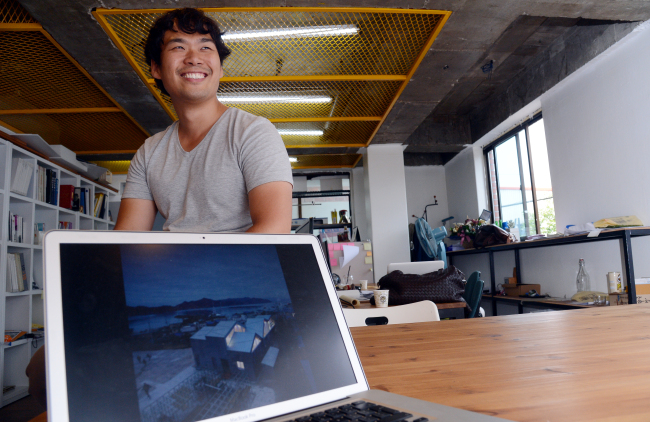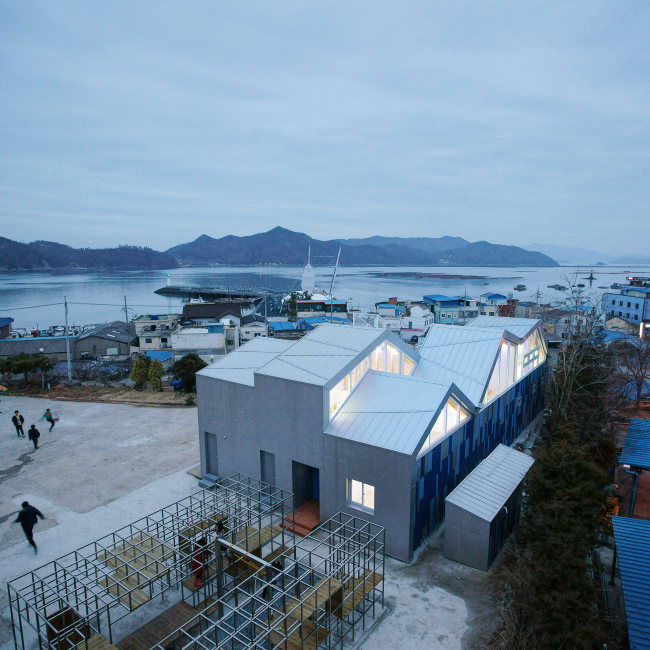Talents used for good
Skill-based volunteerism heralds small but profound change in communities and donation culture
By Korea HeraldPublished : July 12, 2013 - 20:56
When Won You-min, a 31-year-old architect, was requested to build a private childcare center in a small and isolated fishing village near Gangjin, South Jeolla Province, all he could think of was how to politely decline. Not only because he had no experience with designing a children’s facility but also because it was an offer made by a non-governmental organization that did not have sufficient funding. But soon after the architect reached the village, some 500 kilometers south of Seoul, he couldn’t help but change his mind.
“I was shocked at first when I saw children wandering around the seashore because they had no place to go,” Won, a partner at JYA-rchitect, said in an interview with The Korea Herald. “They didn’t have any one to feed them, educate them and play with after school until it gets really dark at night. The center was the only place where they could go,” he said, adding that they were mostly from parentless and broken families in the region.
“I was shocked at first when I saw children wandering around the seashore because they had no place to go,” Won, a partner at JYA-rchitect, said in an interview with The Korea Herald. “They didn’t have any one to feed them, educate them and play with after school until it gets really dark at night. The center was the only place where they could go,” he said, adding that they were mostly from parentless and broken families in the region.

The Gangjin Childcare Center, run by a local pastor, was demolished after the village was hit hard by a powerful typhoon last year. Because it was registered as a private property, the center couldn’t get a penny from the local government.
After talking with a few children there, Won instantly felt a sense of responsibility as an architect. He had no choice but to help by doing what he was good at ― building houses.
Making a profit was off his list. All he wanted to do was complete the project with the limited amount of money raised by the local community and businesses.
Based on the children’s drawings of their dream center, the architect decided to build a house with a pointed rooftop ― a place like home, he said. To save on the cost, he even moved to the village in September. The architect educated in the Netherlands spent three months there to design, supervise construction and help the NGO raise funds.

On Jan. 31, Won opened the new center. The two-story building now has become a safe home for 60 children. It has also become something that the children feel proud of ― for the first time in their lives.
Won is among those who share their skills, knowledge and know-how to help underprivileged people stand on their own feet.
Talent donation, or talent sharing, refers to making a contribution to society with one’s own talent, rather then simply writing checks for the needy.
From mentoring struggling students to building a house like Won did, people with various types of talents are stepping up efforts to help others in need.
A team of doctors at Samsung Medical Center in Gwanghwamun runs a free medical consultation program in the hospital’s lobby every day. Led by Chang Choong-hyun, a plastic surgeon at the hospital, the team currently has 12 senior doctors offering free advice to patients having trouble making medical decisions.
“Patients often come to hospital not knowing which doctors to consult with and also leave the hospital with a package of questions unsolved even after they get prescriptions or a doctor’s diagnosis,” Chang said.
Sitting right next to an information booth at a humble desk, Chang and his colleagues spend an hour or two per week answering various questions from children to the elderly ― and sometimes foreigners. While there are some who ask odd questions such as the location of the rest room, Chang said the program offered him a chance to better understand patients.
“This is very meaningful experience for me to talk with a patient in a place other than clinics, labs or operating rooms. It is very rewarding for me as a doctor because it gives me a chance to better understand the patients,” he said. Chang plans to continue the program even if he retires next year.
Kkitchen, an online community, mobilizes its members to develop pro bono volunteer opportunities. Kkitchen, meaning friends who share talents, now has more than 800 members eager to share their skills. The members mainly help elementary and middle-school students from low-income families who can’t afford private education after school and struggle with planning for their future.
Members, consisting of people with various jobs from photographers and artists to office workers, run weekend classes at local schools, teaching subjects ranging from art to science. The honorary teachers also become mentors to students, encouraging them to have a dream.
“I believe that everyone is born with their own talent and their talent can make a difference in the world,” wrote Kim Young-kwang, founder and manager of the online community. “And I wanted to create a channel so that people could actively engaged themselves in a sharing culture,” he said.
The skill-sharing movement was led by a few celebrities and high-profile figures in the beginning. But the concept of sharing culture is fast spreading as more and more people experience the power of skill sharing.
The skill-based volunteerism inspires people more because sometimes it brings a small but profound change in communities.
“A growing number of people are learning that their skills can be an efficient and meaningful tool to share with others,” said Lee Pil-young, marketing manager at ChildFund Korea, an NGO that works for children’s welfare and health.
Talent sharing is sometimes even more powerful than a financial donation.
“Talent donation inspires people more. It has much bigger power to motivate individuals that their talents could bring unexpected life changes that money can’t buy,” she added.
With the culture of skill-based sharing getting popular, the NGO plans to launch a team to better manage the pool of people wanting to share their talents.
“It is important to build a system to match the strength of people with specific needs in order to pursue the goal of sharing on a long-term basis,” Lee said.
What interests people even more about talent donation is that it makes them feel rewarded and engaged.
The architect Won said, “Although I earned nothing financially, I was satisfied with the project because it urged children to have dreams and made them believe that they also can make a difference miraculously in the future.”
Won plans to continue his talent sharing project, just as a small part of his own business, stressing that he also had to make living.
Won is currently working with ChildFund Korea to build a new house for families living in extremely poor conditions in rural areas.
By Cho Chung-un (christory@heraldcorp.com)
-
Articles by Korea Herald



![[Weekender] Pet food makers bet big on ‘recession-free’ pet food market](http://res.heraldm.com/phpwas/restmb_idxmake.php?idx=644&simg=/content/image/2024/05/10/20240510050754_0.jpg&u=20240512145510)



![[Drama Tour] Romantic trip to ‘Queen of Tears’ filming spots](http://res.heraldm.com/phpwas/restmb_idxmake.php?idx=644&simg=/content/image/2024/05/09/20240509050798_0.jpg&u=20240511190213)











